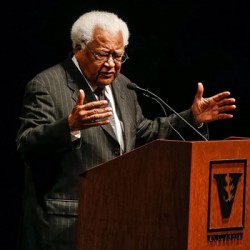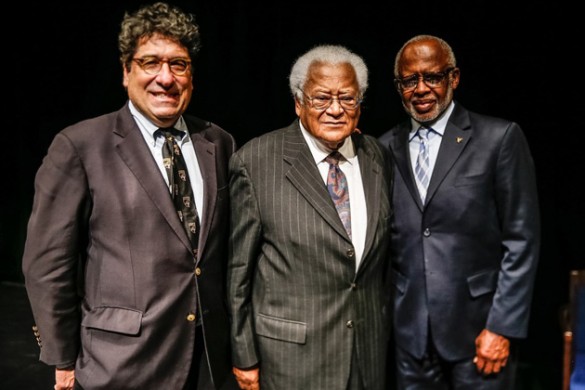
The United States is in the midst of its second American Revolution, and its people must make a choice if the country is to move forward into a true democracy with equality, freedom and justice for all, the Rev. James Lawson says.
“When we ask ourselves ‘where do we go from here,’ we are not talking about the civil rights movement, we are talking about democracy,” Lawson said in his Jan. 18 keynote speech for Vanderbilt University’s 2016 MLK Day celebration. “Can we the people of the United States of America continue to have a society with racism, sexism and violence? Can we be a democratic society when for 250 years our primary form of capitalism has been plantation capitalism?”
Lawson, 87, whom Martin Luther King Jr. called “the leading nonviolence theorist in the world,” brought his message to a capacity crowd at Langford Auditorium in the final event of Vanderbilt’s MLK Commemoration, which ran Jan. 15-18.
See social media highlights of the commemoration »
Prior to his remarks, Chancellor Nicholas S. Zeppos thanked the audience for coming and acknowledged the many members of the Vanderbilt community who had participated in the day’s events. “It gives me strength in our community to see so many people here,” Zeppos said, “for a day of education beyond the classroom, for the people who saw this not as a day off but a day on, a day to remember and a day to learn and a day to transform.”
Lawson was introduced by Taylor McMahan, president of the Black Student Association, and Elizabeth Shahnasarian, president of Vanderbilt Student Government.
In his opening comments, Lawson said he was glad to be back at Vanderbilt and in Nashville. “When I come to Nashville, I sense that this is in many ways where I belong. It’s a part of me and I’m a part of you. (As a Divinity student) at Vanderbilt, I had three very fine semesters, and part of a fourth,” he said to gentle laughter from the crowd. “I came to recognize this was exactly where I needed to be in my theological education.”
Lawson came to Vanderbilt in 1958 to attend the Divinity School, having already been involved in the civil rights movement and a proponent of Ghandi’s principles of nonviolent resistance, which he studied while a missionary in India. He was expelled from Vanderbilt in 1960 because of his work helping desegregate lunch counters in downtown Nashville. The controversial expulsion, which prompted many Vanderbilt professors to submit their resignations, became known as “the Lawson affair.” A compromise was later worked out whereby Lawson was permitted to pursue his graduate studies at Vanderbilt, but he chose to complete his degree at Boston University. He returned to Vanderbilt Divinity School on a sabbatical during 1970 and 1971.

In 1996 Lawson received the Vanderbilt Divinity School’s first Distinguished Alumnus Award. The Vanderbilt Alumni Association also recognized him as a Vanderbilt Distinguished Alumnus in 2005. In 2006, he returned to campus as a Distinguished University Professor and taught at the university until 2009. In 2007, Vanderbilt established the James M. Lawson Jr. Chair at Vanderbilt in his honor, and in 2013 he donated a significant portion of his papers to Vanderbilt Libraries’ Special Collections.
In his hourlong remarks, Lawson told the crowd that during the 1950s and 60s, the protestors did not talk as much about civil rights as they did about equality, freedom and justice. That focus has not changed.
“Our founding fathers said, ‘we hold these truths to be self-evident’ and ‘we the people of the United States of America.’ Those two phrases represented a monumental new voice in a world where top-down tyranny was the model and the convention,” he said. “They were not talking about democracy coming out of the elitism of ancient Greece, but a democracy which said we the people have certain unalienable rights, we the people have the possibility of understanding ourselves and others with such reality that we can mold a society where every man and every woman and every child is counted as somebody in a society that is accepting and caring.
“The civil rights movement is a challenge to the nation to become a democratic society, not to wander in the chaos of the present moment but to move systematically toward community,” he said. “We must love each other through injustice to become a beloved community.”
Lawson also spoke about the impact of sexism in today’s society. “There are 53 wars going on in the world right now, and women and children are the major victims,” he said. “We have a movement that says it’s pro-life but nevertheless is an anti-woman display of despising, wanting women to be under our male management rather than free agents of creation able to make essential contributions to the well-being of the earth. Maybe the reason our foreign policy is so militarily oriented and keeping the American people fearful for their own skins is because we have not elevated women to the place where women can participate in the decision-making.”
Looking to the future, Lawson asked the audience, “Has the violence of the 20th and 21st century fulfilled the aspirations of the people of the earth? … No. The answer has to be no.”
The answer, he said, lies in dismantling the structures that are based in racism, sexism and violence. He suggested that the Vanderbilt community was a good place to begin these efforts. “These ideas must become the fabric of the structures of Vanderbilt,” he said. “What if Vanderbilt could become the sterling illustration of what university means for the human family? Leaving behind its history … and bringing to the foreground an education dedicated to human life, human endurance, wisdom, so that we know the beauty and the wonder and the life of the universe in our life.
“Let each of us be a person who represents the essence of being human in the midst of a chaotic world, who allows space for the beloved community and the unimaginable ways we can live,” Lawson said. “We the people have come a long way, and we need to remind ourselves that we have an equally long way left to go.”












